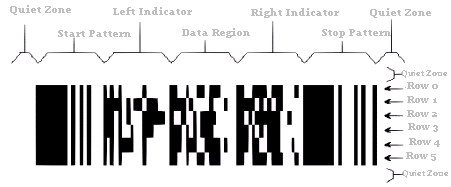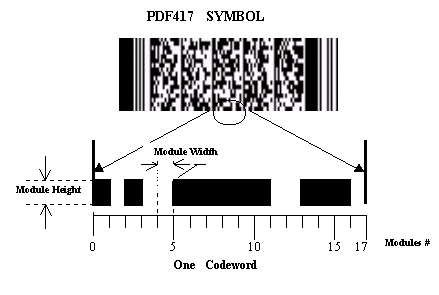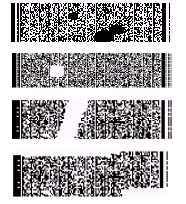PDF417, or Portable Data File 417, is a two-dimensional stacked bar code symbology capable of encoding over a kilobyte of data per label. This is important for applications where a bar code must be more than merely an identifier such as an index to reference a database.
The portable data file approach is well suited to applications where it is impractical to store item information in a database or where the database is not accessible when and where the item’s bar code is read. Because a PDF417 symbol can store so much data, item data such as the content of shipping manifest or equipment maintenance history can be carried on the item, without requiring access to a remote database.
PDF417 is setting new standards for identification. From drivers’ licenses to social services and national ID cards, PDF417 has become the preferred means of encoding ID information. PDF417 answers the need to store and transfer large amounts of data securely and inexpensively. A single PDF417 symbol carries up to 1.1 kilobytes of machine-readable data and it can contain biometric data files such as photographs, fingerprints, and signatures, as well as text, numerics and graphics. Symbol’s total solution approach to PDF417 includes an extensive line of high performance products capable of reading both PDF417 and 1-D symbols.
Each PDF417 symbol consists of a stack of vertically aligned rows with a minimum of 3 rows (maximum 90 rows). Each row includes a minimum of 1 symbol character (maximum 30 symbol characters), excluding start, stop and row indicator columns. The symbol shall include a quiet zone on all four sides. The following picture illustrates a PDF417 symbol.

Each symbol character is 17-module wide which always consists 4 bars and 4 spaces. Each symbol character represents a value ranging from 0 to 928 which is called ��codewords�� in the specification.
You can adjust the following parameters of a PDF417 symbol:
Number of Rows
Width of the unit (X dimension)
Height of the unit (Y dimension)
Number of Columns (or Aspect Ratio of the symbol)
The following picture illustrates a PDF417 codeword structure.

One of PDF417’s primary features is error detection and error correction. Each label has 2 codewords of error detection. The error correction capacity may be selected by the user, based on application needs, when the label is to be generated.
Error detection requires two error-detection codewords per symbol. The error correction scheme involves flexibility and user selection; it compensates for label defects and misdecodes.
At the time of printing a PDF417 bar code, the user specifies a security level in the range 0 – 8. This means, for example, that at level 6, a total of 126 codewords can be either missing or destroyed and the entire label can be read and decoded; up to that limit, for security level 6, the contents of the entire label can be recovered.
In addition to correcting for missing or destroyed data, PDF417 also can recover from misdecodes of codewords. Since it requires two codewords to recover from a misdecode, one to detect the error and one to correct for it, a given security level can support half the number of misdecodes that it can of undecoded codewords. Erasures + 2(Misdecodes) < Maximum Limit. The following barcodes can be recovered.

The maximum data density is determined by the smallest elements which can be reliably printed and scanned. Using the smallest recommended element size of 0.0075 inch wide and 0.010 inch high, the maximum data density in the binary mode is 686 bytes per square inch (106.2 bytes per square centimeter). In the printable ASCII mode the density is 1,144 characters per square inch (177.2 characters per square centimeter).
PDF-417 symbols require a 2-D scanner; or a standard CCD or laser scanner and special decoding software (a wand scanner will not work). A number of scanners are on the market using both laser and CCD camera technologies. PDF-417 symbols can be printed using most professional-grade thermal transfer label printers on the market. The Barcode Software Center carries several label design and printing programs that can create PDF-417 symbols; we also have function libraries for programmers, programs for creating master artwork, and add-in hardware modules for Hewlett-Packard printers.